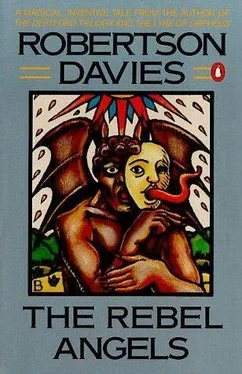Robertson Davies - The Rebel Angels
Здесь есть возможность читать онлайн «Robertson Davies - The Rebel Angels» весь текст электронной книги совершенно бесплатно (целиком полную версию без сокращений). В некоторых случаях можно слушать аудио, скачать через торрент в формате fb2 и присутствует краткое содержание. Жанр: Триллер, на английском языке. Описание произведения, (предисловие) а так же отзывы посетителей доступны на портале библиотеки ЛибКат.
- Название:The Rebel Angels
- Автор:
- Жанр:
- Год:неизвестен
- ISBN:нет данных
- Рейтинг книги:5 / 5. Голосов: 1
-
Избранное:Добавить в избранное
- Отзывы:
-
Ваша оценка:
- 100
- 1
- 2
- 3
- 4
- 5
The Rebel Angels: краткое содержание, описание и аннотация
Предлагаем к чтению аннотацию, описание, краткое содержание или предисловие (зависит от того, что написал сам автор книги «The Rebel Angels»). Если вы не нашли необходимую информацию о книге — напишите в комментариях, мы постараемся отыскать её.
The Rebel Angels — читать онлайн бесплатно полную книгу (весь текст) целиком
Ниже представлен текст книги, разбитый по страницам. Система сохранения места последней прочитанной страницы, позволяет с удобством читать онлайн бесплатно книгу «The Rebel Angels», без необходимости каждый раз заново искать на чём Вы остановились. Поставьте закладку, и сможете в любой момент перейти на страницу, на которой закончили чтение.
Интервал:
Закладка:
I was half Gypsy, and since my Father died the half sometimes seemed in my Mother's estimation to amount to three-quarters, or even seven-eighths. I knew she loved me deeply, but like any deep love there were times when it was a burden, and its demands cruel. To live with my Mother meant living according to her beliefs, which were in almost every way at odds with what I had learned elsewhere. It had been different when my Father was alive, because he could control her, not by shouting or domination – that was her way – but by the extraordinary force of his noble character.
He was a very great man, and since his death when I was sixteen I had been looking for him, or something like him, among all the men I met. I believe that psychiatrists explain such a search as mine to troubled girls as though it were a deep secret the girls could never have uncovered for themselves, but I had always known it; I wanted my Father, I wanted to find a man who was his equal in bravery and wisdom and warmth of love, and once or twice, briefly, I thought I had found him in Clement Hollier. Wisdom I knew he possessed; if it were called for I was sure he would have bravery; warmth of love was what I wanted to arouse in him, but I knew it would never do to thrust myself at him. I must serve; I must let my love be seen in humility and sacrifice; I must let him discover me. As indeed I thought he had, that April day on the sofa. I was not yet disappointed, but I was beginning to be just a little frenzied. When would he show himself the successor to my beloved Tadeusz, to my dear Father?
Can I be a modern girl, if I acknowledge such thoughts? I must be modern: I live now. But like everybody else, as Hollier says, I live in a muddle of eras, and some of my ideas belong to today, and some to an ancient past, and some to periods of time that seem more relevant to my parents than to me. If I could sort them and control them I might know better where I stand, but when I most want to be contemporary the Past keeps pushing in, and when I long for the Past (like when I wish Tadeusz had not died, and were with me now to guide and explain and help me to find where I belong in life) the Present cannot be pushed away. When I hear girls I know longing to be what they call liberated, and when I hear others rejoicing in what they think of as liberation, I feel a fool, because I simply do not know where I stand.
I know where I have been, however, or rather where the people from whom I derive all that I am had their being and lived out vital portions of their fate. My Father, Tadeusz Bonawentura Niemcewicz, was Polish, and he had the misfortune to be born in Warsaw in 1910. Misfortune, I say, because a great war came soon afterwards and his family, which had been well off, lost everything except a strong endowment of pride. He was a man of cultivation, and his profession was that of an engineer, leaning particularly towards the establishment and equipment of factories, and it was this work that took him while he was still young to Hungary, where he soon settled down as one of the Politowski who were numerous in Budapest. In consideration for his Hungarian friends, who thought Niemcewicz hard to pronounce, he added to it the name of his mother, which was Theotoky. She had been of Greek ancestry.
He was a man of romantic temperament – or rather, I should say that is how I like to think of him – and like many such young men he fell in love with a Gypsy girl, but unlike most of the others, he married her. That was my Mother, Oraga Laoutaro.
Not all Gypsies are nomads, and my Mother's family had been musicians in Budapest for generations, because the Gypsy musicians would much rather play in comfortable restaurants, officers' clubs, and the houses of rich people than wander the roads. Indeed, the Gypsy musicians think of themselves as the aristocracy of their people. My Mother was an oddity, because she played her violin in public; usually the Gypsy fiddlers are men, and the women sing and dance. She was beautiful and exciting, and the young Polish engineer pursued her and at last persuaded her to marry him, both in Gypsy form and in the Catholic Church.
When the Second World War was approaching, my Father smelled it on the breeze, or more probably smelled it in the industrial work in which he was occupied. He determined to get out of Europe, and made arrangements which took so much time that he and my Mother barely made it to England before war broke out in the autumn of 1939. There they were joined by my Mother's brother Yerko, who had been travelling in France – for reasons I shall tell in good time – and there they remained until 1946; my Father was in the Army, but not as a fighter; he designed equipment and planned its manufacture, and Yerko worked with him as an artificer, a maker of models. Tadeusz and my Mother had a child, but it died, and it was not until after they had come to Canada and settled in Toronto that I was born, in 1958, when my Mother was already near forty. (She always said she was born in 1920, but I don't think she really knew, and certainly had nothing that would support it.) By that time my Father and Yerko were well set up in a business of their own, manufacturing equipment for hospitals; my Father knew how manufacturing should be managed, and Yerko, who was a brilliant metalsmith, could make and improve the working models of anything my Father could design. Everything seemed to move on a wave of success until my Father died in 1975, not dramatically of overwork but draggingly of a neglected cold which turned into other things and could not be defeated. And with my Father's death our family, which had been pretty much, I suppose, like scores of other European families that had settled in Canada, a little foreign but not markedly at odds with the prevailing North American style of life, took a sharp turn from which it has not recovered.
My Father was a strong character, and though he loved my Mother greatly, and loved to think of her as a Gypsy girl, it was clear that he wanted things in the family to go in the upper-class Polish way. My Mother dressed like a woman of means, and some good shops repressed her taste for gaudy colours and droopy silhouettes. She rarely spoke the Romany that was her cradle language, except to me and to Yerko, and her ordinary language with my Father was Hungarian; she learned a little Polish from him and I learned that language as well as I learned Hungarian; she was sometimes jealous that he and I could speak together in a tongue she did not follow perfectly. English she never learned perfectly, but in Toronto there were quite enough people for her to talk to in Hungarian for that not to be a severe handicap. In the company of English-speaking people she employed a broken English to which she managed to give a certain elegance – English-speaking people being pushovers for that kind of speech. Looking back over the years before my Father's death, I realize now that Mamusia lived a somewhat muted, enclosed life. A beloved man had enveloped her, as now Hollier enveloped me.
Mamusia was what my parents wanted me to call her – the appropriate pet-name of a well-bred Polish child for its Mother. Canadian children who heard me thought I was saying Mamoosha (Canadians are incorrigibly tin-eared) but the proper way to say the word is delicate and caressing. I also, on birthdays and at Christmas, called her Edesanya, which is high-class Hungarian, and I usually called my Father by the Hungarian form, which is Edesapa. When my Mother wanted to vex him, she would encourage me to call her Mamika – which is about equivalent to Mommix in English – and he would frown and click his tongue. He was never angry, but the tongue-clicking was rebuke enough for me.
I think I was rather stiffly brought up, for Edesapa did not like the free-and-easy Canadian ways and could not see that they meant no disrespect. He was startled to discover that at the good convent school to which I was sent we were taught to play softball and lacrosse, and that the nuns bundled up their skirts and played with us. Nuns on skates – which is a very pretty sight – troubled him dreadfully. Of course these were the old nuns, in skirts to their feet; the revolution in convent dress of the sixties almost persuaded him that the sky was falling. I know now that an ageing romantic is hardly to be distinguished from an ageing Tory, but as a loyal child I tried to share some of his sense of outrage. Not successfully. It was a black day when he learned that, like the other girls at the convent, I referred to the Mother Superior behind her back as The Old Supe. Poor Edesapa, so sweet, so courteous, so chivalrous but, even I must admit, so stuffy about some things. It was the nobility of spirit and the high ideals that won me and hold me still.
Читать дальшеИнтервал:
Закладка:
Похожие книги на «The Rebel Angels»
Представляем Вашему вниманию похожие книги на «The Rebel Angels» списком для выбора. Мы отобрали схожую по названию и смыслу литературу в надежде предоставить читателям больше вариантов отыскать новые, интересные, ещё непрочитанные произведения.
Обсуждение, отзывы о книге «The Rebel Angels» и просто собственные мнения читателей. Оставьте ваши комментарии, напишите, что Вы думаете о произведении, его смысле или главных героях. Укажите что конкретно понравилось, а что нет, и почему Вы так считаете.












